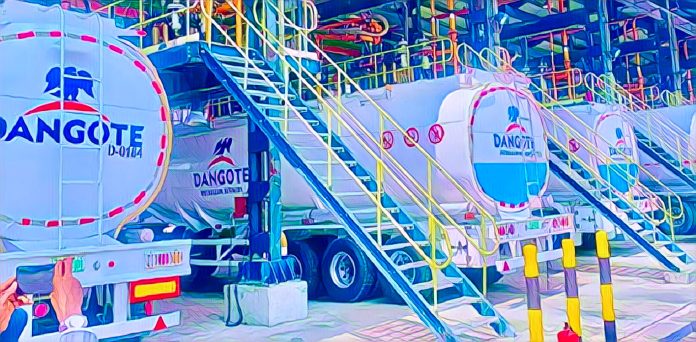KEY POINTS
-
Dangote refinery starts free direct fuel delivery.
-
NARTO says its contracts face collapse.
-
Marketers welcome lower petrol prices.
The Dangote refinery’s new direct fuel distribution plan is reshaping Nigeria’s downstream petroleum sector.
Bulk fuel consumers and filling stations are abandoning long-standing middlemen contracts to secure free fuel delivery directly from Dangote.
Bulk fuel buyers shift supply chain
The policy has unsettled the National Association of Road Transport Owners, whose members operate about 30,000 trucks. The group’s president, Yusuf Othman, voiced concerns on TVC News, arguing that Dangote’s strategy undermines legally binding contracts signed between his members and corporate clients, including telecoms and filling stations.
According to Othman, members had used those agreements as collateral for bank loans to purchase trucks. Now, with Dangote supplying fuel directly, those arrangements risk collapse. “Our agreements are at stake because a big brother is coming to supply directly,” he said.
Othman further alleged that the practice may be in breach of Section 212 of the Petroleum Industry Act. He urged the Federal Government and the Nigerian Midstream and Downstream Petroleum Regulatory Authority to intervene.
Dangote free fuel distribution starts nationwide
According to Punch, Dangote flagged off the distribution scheme last week with over 1,000 compressed natural gas-powered trucks. The first phase will serve Lagos, Ogun, Ondo, Oyo, Osun, Ekiti, Edo, Delta, Rivers, Kwara, and Abuja.
Fuel prices under the scheme are being slashed, with petrol set at N841 per litre in Lagos and nearby states, and N851 in Abuja and the South-South.
Independent marketers have already confirmed deliveries. Abubakar Shettima, president of the Independent Petroleum Marketers Association of Nigeria, told reporters that trucks are moving products across the Western Zone. “Marketers are pleased with the development,” he said, noting prices would fall from N865 to N841 once deliveries reach filling stations.
While Othman has since stepped back from further public comment, he confirmed discussions are underway for possible negotiations.



